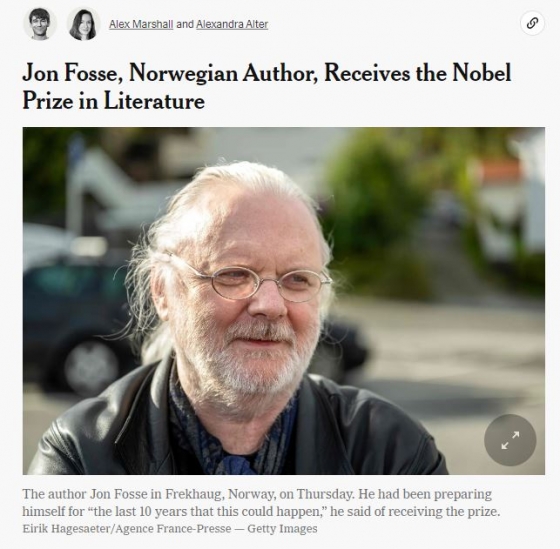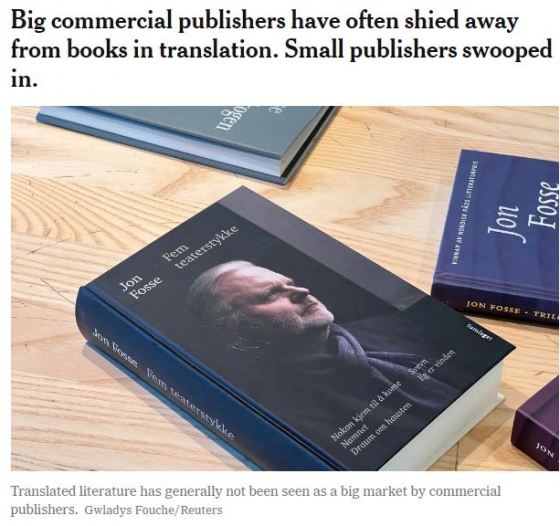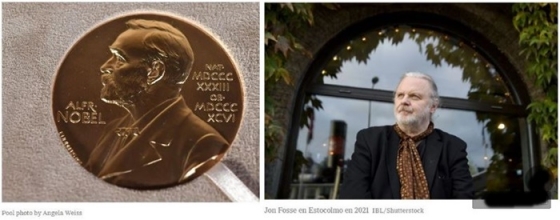


|

|
2023 노벨문학상 노르웨이 욘 포세 작가 수상
“말할 수 없는 것에 목소리를 내는 혁신적인 희곡과 산문“을 인정받았다.
등록일: 2023-10-06 , 작성자: 광진의소리 
<영문 기사 및 포토 = 뉴욕타임즈에서 옮김>
The Norwegian novelist, poet and playwright Jon Fosse — who has found a growing audience in the English-speaking world for novels that grapple with themes of aging, mortality, love and art — was awarded the Nobel Prize in Literature on Thursday, “for his innovative plays and prose which give voice to the unsayable.”
노화, 죽음, 사랑, 예술 등을 주제로 다룬 소설로 영어권에서 관객이 늘고 있는 노르웨이의 소설가이자 시인, 극작가인 존 포시(Jon Fosse)가 목요일 “말할 수 없는 사람들에게 목소리를 내는 혁신적인 연극과 산문“으로 노벨 문학상을 수상했습니다
A prolific writer who has published some 40 plays, as well as novels, poetry, essays, children’s books and works of translation, Fosse has long been revered for his spare, transcendent language and formal experimentation.
소설, 시, 수필, 아동 도서, 번역 작품뿐만 아니라 40여 편의 희곡을 출판한 다작 작가인 포시는 그의 자유롭고 초월적인 언어와 형식적인 실험으로 오랫동안 존경 받아 왔습니다.
In a news conference on Thursday, Anders Olsson, the chairman of the Nobel literature committee, praised “Fosse’s sensitive language, which probes the limits of words.”
앤더스 올슨 노벨문학위원회 위원장은 17일 기자회견에서 “말의 한계를 탐구하는 포세의 예민한 언어“라고 극찬했습니다.
|

Fosse’s work has been translated into around 50 languages and he is among the world’s most widely performed living playwrights. But he has only recently found major acclaim in English-speaking countries, thanks mainly to his fiction: “A New Name: Septology VI-VII” was a finalist for a National Book Award last year, and two of his novels have been nominated for the International Booker Prize.
Fosse의 작품은 약 50개의 언어로 번역되었고, 그는 세계에서 가장 널리 공연되는 살아있는 극작가 중 한 명입니다. 그러나 그는 주로 그의 소설 덕분에 최근에서야 영어권 국가들에서 주요한 찬사를 발견했습니다: “새로운 이름: 셉톨로지 6-7“은 작년에 내셔널 북 어워드의 최종 후보에 올랐고, 그의 소설 중 두 권은 국제 부커상 후보에 올랐습니다.
He has long been tipped to receive the Nobel. In 2013, British bookmakers even temporarily suspended betting on the award after a flurry of bets on his winning, although the prize did not come his way for another decade. When it finally did, the call from the Nobel Prize’s organizers came while Fosse was traveling to Frekhaug, a village on Norway’s west coast where he has a home.
그는 오랫동안 노벨상 수상 가능성이 제기되어 왔습니다. 2013년, 영국의 책 제작자들은 그의 수상에 대한 수많은 베팅이 있은 후 상에 대한 베팅을 잠시 중단하기도 했습니다. 비록 상이 10년 더 그의 뜻대로 되지는 않았지만, 마침내 이루어졌을 때, 노벨상 주최자들의 전화는 포세가 그의 집이 있는 노르웨이 서해안의 한 마을인 프레카우그로 여행 중에 왔습니다.
In a statement sent through his Norwegian publisher, Fosse, 64, said he was “both really happy and really surprised” to receive the award. “I have been among the favorites for 10 years, and felt sure that I would never get the prize,” he said. “I simply cannot believe it.”
그의 노르웨이 출판사를 통해 보낸 성명서에서 64세의 포세는 그가 상을 받게 되어 “정말 행복하고 정말 놀랐습니다“라고 말했습니다. “저는 10년 동안 우승 후보 중 한 명이었고, 제가 그 상을 결코 받지 못할 것이라고 확신했습니다“라고 그는 말했습니다. “저는 단지 그것을 믿을 수 없습니다.“
Asked what he aimed to convey to readers in his work, Fosse said he hoped to impart a feeling of serenity.
“I hope they can find a kind of peace in, or from, my writing,” he said.
작품 속에서 독자들에게 무엇을 전달하고 싶었냐는 질문에 포시는 평온한 느낌을 주고 싶다고 말했습니다.
“저는 그들이 제 글에서, 혹은 그로부터 평화를 찾을 수 있기를 바랍니다“라고 그는 말했습니다.
In receiving what is widely seen as the most prestigious honor in literature, Fosse (whose name is pronounced Yune FOSS-eh, according to his translator) joins a list of laureates including Toni Morrison, Kazuo Ishiguro and Annie Ernaux.
문학계에서 가장 권위 있는 영예로 널리 알려진 것을 수상하면서, 포세(그의 번역가에 따르면 Yune FOSS-eh로 발음되는 이름)는 토니 모리슨, 가즈오 이시구로, 애니 에르노를 포함한 수상자 명단에 합류합니다.
Critics have compared Fosse’s sparse plays to the work of two other Nobel laureates: Harold Pinter and Samuel Beckett. He’s also been called “the new Ibsen,” after the renowned Norwegian playwright Henrik Ibsen.
비평가들은 포세의 희박한 희곡들을 다른 두 명의 노벨상 수상자인 해롤드 핀터와 사무엘 베케트의 작품과 비교했습니다. 그는 또한 유명한 노르웨이 극작가 헨리크 입센의 이름을 따 “새로운 입센“이라고 불립니다.
Born in 1959 in Haugesund, Fosse grew up in western Norway, on a small farm in Strandebarm. He started writing poems and stories at age 12, and has said he found writing to be a form of escape. “I created my own space in the world, a place where I felt safe,” he told The Guardian in 2014.
1959년 하우게순(Haugesund)에서 태어난 포시(Fosse)는 노르웨이 서부 스트란데바름(Strandebarm)의 작은 농장에서 자랐습니다. 그는 12살 때 시와 이야기를 쓰기 시작했고, 글쓰기가 탈출의 한 형태임을 발견했다고 말했습니다. “저는 세상에 저만의 공간, 안전하다고 느끼는 곳을 만들었습니다.“라고 그는 2014년 가디언과의 인터뷰에서 말했습니다.
As a young man, he was a communist and an anarchist. He studied comparative literature at the University of Bergen. Fosse writes in Nynorsk, a minority language, rather than Bokmål, the more widely used Norwegian language for literature. While some have interpreted his use of Nynorsk as a political statement, Fosse has said it’s simply the language he grew up with.
젊었을 때, 그는 공산주의자이자 무정부주의자였습니다. 그는 베르겐 대학에서 비교 문학을 공부했습니다. 포시는 문학을 위해 더 널리 사용되는 노르웨이 언어인 복몰(Bokmål) 대신 소수 언어인 니노르스크(Nynorsk)로 씁니다. 일부에서는 그가 니노르스크를 정치적인 표현으로 사용하는 것으로 해석하는 반면, 포시는 그것이 그가 자란 언어일 뿐이라고 말했습니다.
| 
Image
A triptych of covers for the book that comprise the Septology series.
In 1983, he published his debut novel, “Red, Black,” kicking off a remarkably prolific career. His most famous works include the “Melancholia” novels, delving into the mind of a painter having a mental breakdown; his novel “Morning and Evening,” which opens with the moment of the protagonist’s birth and ends with the last day of his life; and the seven-volume work “Septology,” an opus that runs for more than 1,000 pages and is about two elderly artists who might be the same person: One has achieved success, while the other became an alcoholic.
#이하 계속 번역중입니다.(편집자 주)
Jacques Testard, the founder of Fitzcarraldo Editions, Fosse’s British publisher, said his work touched on themes of “love, art, death, mourning and friendship” while “the landscape of the Western fjords near Bergen where he grew up” was almost a character in itself.
Although he started as a poet and novelist, Fosse rose to prominence as a playwright. He gained international recognition in the late 1990s with a Paris production of his first play, “Someone Is Going to Come,” about a man and a woman who have sought solitude in a remote seaside home. Fosse has said he wrote it in four or five days, and didn’t revise it.
For 15 years, he focused on the theater, and traveled widely to international productions of his plays. But then he decided to retreat back into fiction, and stopped traveling, gave up alcohol and converted to Catholicism.
A former atheist who found religion later in life, Fosse has described writing as a form of mystical communion.
“When I manage to write well, there is a second, silent language,” he said in an interview with The Los Angeles Review of Books in 2022. “This silent language says what it is all about. It’s not the story, but you can hear something behind it — a silent voice speaking.”
While Fosse’s work is sometimes formally experimental — “Septology,” for example, unfolds as a single sentence of stream-of-consciousness narration — it can also often feel immersive and gripping.
Decades of writing have taught Fosse humility, and to cast aside expectations, he said in an email interview on Thursday.
“When I start writing I never feel sure that I will be able to write a new work,” he said. ”I never plan anything in advance, I just sit down and start writing. And at a certain point, I have the feeling that the work is already written and I just have to write it down before it disappears.”
“His work can be deceptively simple,” said Adam Z. Levy, the publisher of Transit Books, a small press that began publishing Fosse in the United States in 2020, with the first of his “Septology” series. “He often writes really spare, pared-down prose, but his books catch you by surprise. They take on this really moving quality. The sentences repeat, they meander, they start in one place then come back to that at some point, kind of spiraling outward.”
Damion Searls, one of Fosse’s English-language translators, said that while Fosse has written in a range of mediums, a unifying thread in his work was a feeling of serenity, which is why his work is often described as hypnotic or evocative of a spiritual experience.
“One of the key words he uses to talk about his fiction is peace,” said Searls, who translates from German, Norwegian, French and Dutch. “There’s a real peacefulness in it, even though stuff happens, people die, people get divorced, but it radiates this serenity.”
Along with the prestige and a huge boost in book sales, Fosse will receive 11 million Swedish krona, about $991,000.
Before Fosse, the last Norwegian recipients of the literature Nobel were Sigrid Undset, a writer of historical fiction who took the prize in 1928, and Knut Hamsun in 1920.
In recent years, the Swedish Academy, which organizes the prize, has tried to increase the diversity of considered authors after facing criticism that only 17 Nobel laureates had been women, and that the vast majority were from Europe or North America. The choice of Fosse is likely to be interpreted as a step back from those efforts.
Before Thursday’s announcement, at a news conference in Stockholm, Fosse was among the favorites, although Can Xue, a Chinese writer of often surreal and experimental short stories was also tipped, as were Haruki Murakami; Salman Rushdie; and Ngugi wa Thiong’o, a Kenyan novelist and playwright.
In a statement released through his Norwegian publisher on Thursday, Fosse said he was “overwhelmed, and somewhat frightened.“
When asked nearly a decade ago about his hopes of winning a Nobel, he said that while he would “of course” like to receive it, he was also wary of the burden of expectation it would bring.
“Normally, they give it to very old writers, and there’s a wisdom to that,” he said in an interview with The Guardian. “You receive it when it won’t affect your writing.”
| |  기사에 대한 한줄 의견을 남겨주십시요. 256 남았습니다. 기사에 대한 한줄 의견을 남겨주십시요. 256 남았습니다. |
|
|
|
|



|















 기사에 대한 한줄 의견을 남겨주십시요. 256 남았습니다.
기사에 대한 한줄 의견을 남겨주십시요. 256 남았습니다.




